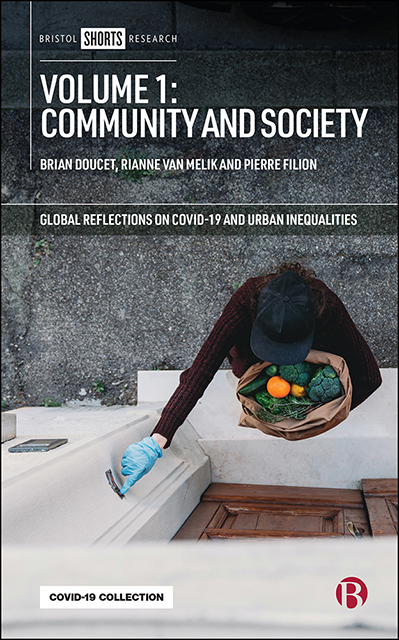Book contents
- Frontmatter
- Contents
- List of Figures and Tables
- Notes on Contributors
- Acknowledgments
- Preface to All Four Volumes of Global Reflections on COVID-19 and Urban Inequalities
- One Introduction
- Part I Working Practices
- Part II Life During Lockdown
- Part III Migration, Migrants, and Refugees
- Part IV Age, Race, Gender, and Ability
- Index
Eleven - Under Quarantine in a City Project: Stories of Fear, Family, Food, and Community
Published online by Cambridge University Press: 13 April 2023
- Frontmatter
- Contents
- List of Figures and Tables
- Notes on Contributors
- Acknowledgments
- Preface to All Four Volumes of Global Reflections on COVID-19 and Urban Inequalities
- One Introduction
- Part I Working Practices
- Part II Life During Lockdown
- Part III Migration, Migrants, and Refugees
- Part IV Age, Race, Gender, and Ability
- Index
Summary
Introduction
In countries around the world, the COVID-19 pandemic has highlighted and exacerbated health, wealth, and racial inequalities (Ku and Brantley, 2020). In the US, Black and Brown Americans are experiencing higher mortality rates from the virus, and they are more likely to experience income loss and eviction (Benfer et al, 2020). Public housing residents in the US, while less vulnerable to housing precarity and eviction, have been directly impacted by neoliberal policies, such as the defunding of US public housing infrastructure and the increase of public-private partnerships, the effects of which the pandemic has amplified (Rice, 2017). Job loss, food insecurity, and increased marginalization from the pandemic have significant downstream effects as many US public housing residents are Black, Latino, children, elderly, or disabled (United States Department of Housing and Urban Development (HUD), 2016). These moments of crises and failure reveal the politics of urban life, but also offer the potential to identify gaps within current infrastructure and provide ways to fill them. The COVID-19 pandemic is one such moment – exposing the inequities and inaccessibility inherent in current neoliberal infrastructures. At the same time, communities are resilient and adaptable, able to produce alternative infrastructures, resources, and support.
Urban studies scholars have examined urban infrastructure as a lively socio-technic system that is ‘social in every aspect’ (Amin, 2014: 157). Accordingly, we define infrastructure as a complex assemblage of social and technological processes that ‘enables – or disables – particular kinds of action in the city’ (Graham and McFarlane, 2014: 1). During the COVID-19 pandemic, many of these urban technological processes collapsed, creating an assemblage of failure that has left a devastating gap between larger infrastructural technologies and people's livelihoods and social community. Yet, through failure, urban centers enter into a process of urban becoming, which opens engrained socio-technic systems to a necessary liveliness of bottom-up infrastructural improvisation (Amin, 2014: 156–7). We contend that people, as an infrastructure, are essential architects that guide this process of urban becoming to create emergent possibilities for an alternative community infrastructure. AbdouMaliq Simone's contention that people are infrastructures focuses on the ‘collaboration among residents seemingly marginalized from and immiserated by urban life’ (Simone, 2004: 407).
- Type
- Chapter
- Information
- Volume 1: Community and Society , pp. 117 - 128Publisher: Bristol University PressPrint publication year: 2021



